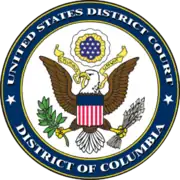TikTok v. Trump
TikTok v. Trump is a pending lawsuit before the United States District Court for the District of Columbia. The lawsuit was originally filed by TikTok as a challenge to President Donald Trump's executive order prohibiting the usage of the application in five stages, the first being the prohibition of downloading TikTok. On September 27, 2020, a preliminary injunction was issued by Judge Carl J. Nichols blocking enforcement of Executive Order 13942.[1]
| TikTok v. Trump | |
|---|---|
 | |
| Court | United States District Court for the District of Columbia |
| Full case name | TikTok, et al. v. Donald J. Trump, et al. |
| Case history | |
| Related action(s) | U.S. WeChat Users Alliance v. Trump |
Background
In June 2020, TikTok was criticized for discreetly accessing the clipboard content on their users' iOS devices, a feature the Chinese company had already said it would stop. TikTok argued this feature was set up as an "anti-spam" measure. TikTok had already been nailed by the US authorities in 2019 for allowing underage children to sign up to its network. Many US agencies had already banned TikTok from its users' terminals.[2] On 7 July 2020, the US Secretary of State Mike Pompeo announced he was considering blocking the Chinese-owned mobile application TikTok in the USA. Some companies followed suit: Amazon temporarily banned TikTok from employees' phones, and Wells Fargo asked its employees to remove the app from their professional phones. On 6 August 2020, the US President issued an executive order making the ban of TikTok a "national emergency". TikTok's CEO, Kevin Mayer, quit on 27 August 2020.[3]
TikTok is a video-sharing social networking application where individuals may share videos that are 3-15 seconds long, and looping videos 3-60 seconds long. Owned by a Beijing-based company, ByteDance,[4] the application has been met with security concerns. For example, the United States Navy and the U.S. Army previously instructed their officers to delete TikTok from devices owned by the government.[5][6][7] On August 6, 2020, President Donald Trump issued an executive order banning the apps WeChat and TikTok, citing national security concerns.[8] Subsequently, TikTok announced that it was filing suit against Trump on August 24, 2020.[9] The Department of Commerce also published an identification of prohibited activities on WeChat and TikTok.[10]
In early September 2020, Microsoft made a bid to acquire TikTok's US operations to make it US-owned and legitimate its presence in the US digital space. The bid was rejected.[11][12] In November 2020, the US government postponed twice TikTok's deadline to sell its US operations to a US-based company.[13]
Proceedings
The initial complaint was filed by TikTok on September 18, 2020. On September 23, 2020, TikTok also filed a motion for a preliminary injunction, which was granted in part and denied in part by Judge Carl J. Nichols on September 27, 2020. In his memorandum opinion, Judge Nichols concluded that TikTok was likely to succeed on its merits, because "informational materials" were being transferred on the application. Irreparable harm was also shown due to the potential competitive losses of TikTok if the ban were to be enacted. Judge Nichols also found that the government's interest was insufficient to warrant a full-on ban of TikTok, and thus granted plaintiffs a preliminary injunction with respect to the "prohibited transactions" listed in "Paragraph 1 of the Commerce Identification."[14][15]
In early December 2020, the U.S. District Judge Carl Nichols fully blocked Trump's request to ban TikTok in the USA. The judge argued that Trump's emergency economic powers did not suffice to operate an arbitrary ban on a mobile app.[16]
References
- "TikTok Wins Reprieve From U.S. Ban". The New York Times. September 27, 2020.
- Kim Lyons, TikTok says it will stop accessing clipboard content on iOS devices, Theverge.com, 26 June 2020
- Elizabeth Lopatto, In 2020, the Trump administration declared war on dancing teens, Theverge.com, 16 December 2020
- "ByteDance". www.bytedance.com. Archived from the original on 21 August 2020. Retrieved 10 August 2020.
- Bell, M.B.; Wang, Echo (20 December 2019). "U.S. Navy bans TikTok from government-issued mobile devices". Reuters. Archived from the original on 21 December 2019. Retrieved 21 December 2019.
- Calma, Justine (31 December 2019). "US Army bans soldiers from using TikTok". The Verge. Archived from the original on 31 December 2019. Retrieved 31 December 2019.
- Harwell, Drew; Romm, Tony (31 December 2019). "U.S. Army bans TikTok on military devices, signaling growing concern about app's Chinese roots". The Washington Post. Archived from the original on 31 December 2019. Retrieved 5 January 2019.
- "Trump Targets WeChat and TikTok, in Sharp Escalation With China". The New York Times. August 6, 2020.
- "TikTok sues Trump administration over U.S. ban, calls it an election ploy". Reuters. August 24, 2020.
- "Commerce Department Prohibits WeChat and TikTok Transactions to Protect the National Security of the United States". Department of Commerce. September 18, 2020.
- Todd Bishop, Microsoft’s bid for TikTok rejected by ByteDance as reports name Oracle the winner of modified deal, Geekwire.com, 13 September 2020
- China-US Trade War : The battle against Tik Tok, Developerz.software, 15 September 2020
- Rishi Iyengar, TikTok owner gets another week to sell its US business, Cnn.com, 26 November 2020
- TikTok v. Trump, No. 1:20-cv-02658-CJN (Order) (D.D.C. Sep. 27, 2020).
- TikTok v. Trump, No. 1:20-cv-02658-CJN (Opinion) (D.D.C. Sep. 27, 2020).
- Bobby Allyn, U.S. Judge Halts Trump's TikTok Ban, The 2nd Court To Fully Block The Action, Npr.org, 7 December 2020